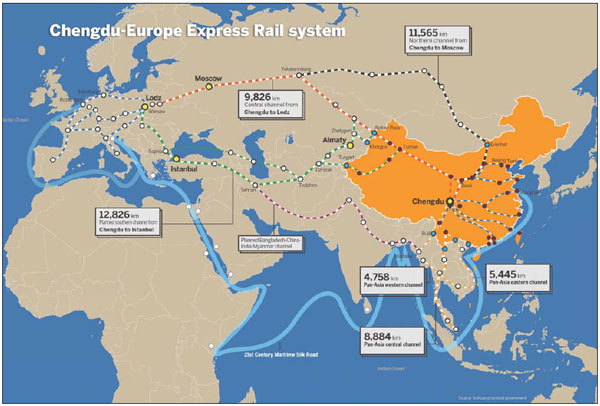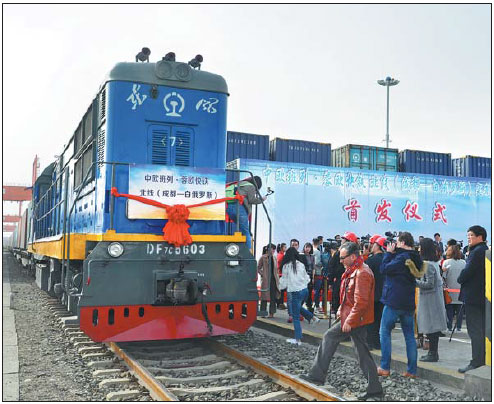Faster freight increases foreign trade
Chinese firms profit from growing transport links to Europe
Chengdu, a megacity in western China, is developing into a world-class transport hub as it expands its international railway network to Belt and Road countries.
In March, Chengdu launched a private freight train service to Belarus, bringing auto parts for 28 cars ordered by Chinese carmaker Geely for its plant in Minsk, capital of Belarus.
The train, running on the northern route of the Chengdu-Europe Express Rail, traveled 8,866 kilometers over 12 days to reach the plant.

Feng Xuhong, deputy general manager of Geely Chengdu, said the auto parts and accessories, worth nearly $600,000, were made at the company's plants in Ningbo, Zhejiang province, and Chengdu.
They will be used to assemble the Geely GC9 luxury sedans in Minsk. Once completed, the vehicles will be mainly sold in Eastern Europe and Central Asia, he said.
The city is expected to open two new public cargo railway routes in the first six months of this year, according to the Chengdu Port and Logistics Office.
The route to Russia is known as the northern route of the Chengdu-Europe Express Rail, while the one to Istanbul is the southern route.
The two new routes, together with the Chengdu-Lodz route already in operation, will be the three major cargo railway routes linking Chengdu and Europe.
The Chengdu-Lodz route, launched in April 2013 in accordance to the Belt and Road Initiative proposed by President Xi Jinping, is the fastest in travel time and most frequently used cargo express service between China and Europe. A oneway trip takes about 10.5 days.
"The greatest advantages of using the Chengdu-Europe Express Rail service is that it saves a lot of time on transport," Feng said.
Geely used to send car parts to Minsk through combined sea and road transport, which takes about 40 days. "The rail route reduces transport time by about three quarters, which shortens the production cycle and saves a lot of costs," he said.
More major manufacturers and logistics companies are using the Chengdu-Europe Express Rail, including DHL, Lenovo Group, TCL and Dell.
Since January 2016, 99 percent of components used for home appliance-maker TCL's TV sets sold in Europe have been transported through the Chengdu-Europe Express Rail.
The components made in Chengdu are shipped by train to the Polish plant, where they are assembled into TV sets and sold to the European market.
Liang Tiemin, vice-president of TCL Multimedia, said TCL's plant in Chengdu is scheduled to increase production to cater for another 800,000 TV sets to be assembled in Poland this year.
"We will make Chengdu our major manufacturing base for TV sets sold in Europe," he said.
City plans expansion of express rail routes
In 2016, the Chengdu-Europe Express Rail made 460 journeys, delivering 73,000 metric tons of goods worth more than $1.3 billion. It is scheduled to run 1,000 journeys this year, according to the city's plan.
To expand its international rail network, Chengdu launched the Chengdu-Europe Plus strategy in 2015, which proposes further rail connections with both domestic and European cities.
In Europe, the Chengdu-Europe Express Rail has expanded to cities including Kutno in Poland, Nuremberg in Germany and Tilburg in the Netherlands. It is planned to further expand to cities such as London, Moscow, Milan and Prague, covering almost all countries and regions in Europe.
The express rail has expanded to other domestic cities, including Xiamen in Fujian province, Shenzhen in Guangdong province, Kunming in Yunnan province and Ningbo in Zhejiang province. It is also expected to cover China's Pearl River Delta, Yangtze River Delta and Bohai Economic Rim, as well as some East and Southeast Asian countries and regions.
Chen Zhongwei, director of the Chengdu Port and Logistics office, said: "The city will continue to implement the Chengdu-Europe Plus strategy and improve the international rail network, making Chengdu an international rail hub and logistics center."
He said the city is currently planning to open an express rail to Hanoi, capital of Vietnam, and another to the Indo-China Peninsula.
By 2020, Chengdu is expected to set up more than 10 overseas distribution centers and 10 representative offices along its international rail routes. International railways starting from Chengdu are expected to run 2,000 journeys a year.
pengchao@chinadaily.com.cn

|
Chengdu launches a freight train service to Belarus on March 1. The train runs on the northern route of the Chengdu-Europe Express Rail.Peng Chao / China Daily |
(China Daily 04/25/2017 page12)









